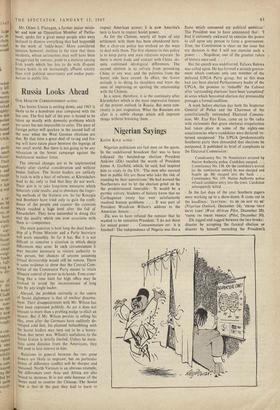Russia Looks Ahead
OUR MOSCOW CORRESPONDENT writes:
The Soviet Union is settling down, and 1965 is likely to be a humdrum year compared with the last one. The first half of the. year is bound to be taken up mostly with domestic problems which are acute but not impossible to solve. The pace of foreign policy will quicken in the second half of the year when the West German elections are due. By that time a great deal of to-ing and fro- ing will have taken place between the bigwigs of our small world. But there is not going to be any relaxation in the Soviet campaign against the multilateral nuclear force.
The internal changes are to be implemented slowly after careful consideration and without undue fanfare. The Soviet leaders are unlikely to rush in with a host of reforms, as Khrushchev used to do, only to find that they do not work. Their aim is to take long-term measures which definitely yield results, and to eliminate the linger- ing methods of the Stalinist era. So far Kosygin and Brezhnev have tried only to gain the confi- dence of the people and counter the cynicism Which reached a high level after the fall of Khrushchev. They have succeeded in doing this and the quality which one now associates with them is—competence.
The main question is how long the dual leader- ship of a Prime Minister and a Party Secretary will work smoothly. So far it has. But it is not difficult to conceive a situation in which sharp differences may arise. In such circumstances it May become necessary to restore authority to one person, but chances of anyone assuming virtual dictatorship would still be remote. There is some evidence to show that the Central Com- mittee of the Communist Party, means to retain Ultimate control of power in its hands. Even some- thing like a time limit for high office may be evolved to avoid the inconvenience of long rule by any single leader.
• Abroad, the problem currently at the centre of Soviet diplomacy is that of nuclear disarma- ' rnent. Their disappointment with Mr. Wilson has now been expressed publicly. As yet it does not amount to more than a probing nudge to elicit an answer. But if Mr. Wilson persists in selling his idea, even after the Germans have suddenly de-
veloped cold feet, his planned hobnobbing with the Soviet leaders may turn out to be a honey- 'noon that never was. Wilson's usefulness to the Soviet Union is strictly limited. Unless he main- tains some distance from the Americans, they Will tend to lose interest in him.
Relations in general between the two great Dowers are likely to improve; but on particular Points of difference conflict will be sharper and sustained, North Vietnam is an obvious example, bound differences over Asia and Africa are also 0ound to increase. It is not only because of the Soviet need to counter the Chinese. The Soviet view is that in the past they had to learn to
respect American power; it is now America's turn to learn to respect Soviet power.
As for the Chinese, nearly all hope of any settlement with them has been abandoned here. But a clear-cut policy has evolved on the ways to deal with them. The first element in this policy is to keep party and state relations separate. So there is more trade and contact with Chiria de- spite continued ideological differences. The second element is to refrain from provoking China in any way, and the polemics from the Soviet side have ceased. In effect, the Soviet attitude is to shrug its shoulders and leave the onus of improving or spoiling the relationship with the Chinese.
In a sense, therefore, it is the continuity after Khrushchev which is the most impressive feature of the present outlook in Russia. But mere con- tinuity is just stagnation. What the Russians are after is a subtle change which will improve things without breaking them.






























 Previous page
Previous page